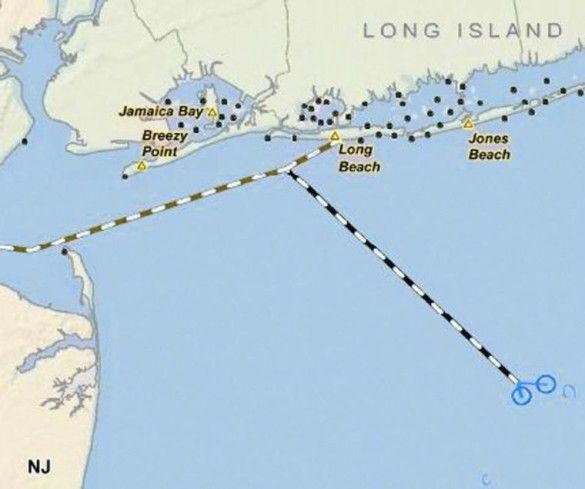Liberty Natural Gas Looking To Build Fuel Port Outside New York Harbor

Local environmentalists were outraged at Liberty Natural Gas’s proposed plan to place a fuel port 20 miles off the coast of New York Harbor. The Queens Chronicle is reporting that Liberty argues that building the port will save New York and New Jersey residents $325 million per year.
The area surrounding Jamaica Bay, New York Harbor and the coast of New Jersey has become a battleground between environmental activists and big energy operators. Recently, Transco Williams won the right to build a 1.6-mile natural gas pipeline that stretches underneath Jacob Riis Park and ends at a meter and regulating station positioned at Floyd Bennett Field. Environmentalists fought the pipeline’s construction, arguing that it could harm the Jamaica Wildlife Refuge, local animal life and residents. Despite protests, the approved construction of the pipeline appears to be moving forward.
The Queens Chronicle describes the purpose of the new port, which would connect to the pipeline in Jamaica Bay:
Liberty Natural Gas submitted an application to the government to construct and operate Port Ambrose, a facility for importing liquified natural gas from Trinidad and Tobago. Specially designed vessels carrying liquified natural gas would regasify the fuel on-board and feed it into loading buoys and pipes which would link to the existing Transco pipeline, near Jacob Riis Park in the Rockaways. The project would cost $300 million.
Liquified natural gas, or LNG, is primarily methane, cooled and condensed into liquid form, so that it is one six-hundredth of its usual volume, which makes it possible to ship.
According to Roger Whelan, the president of Liberty Natural Gas, natural gas prices in New York spike during the winter and summer months and importing the gas would keep prices down. Whelan claims the port will save consumers $325 million per year.
As Liberty prepares their $300 million project, environmentalists are coming out strong again, arguing that the port would create a threat comparable to a terrorist threat. Jamaica Bay Ecowatch member Dan Mundy was uncompromising in his opposition to the project:
Dan Mundy Jr., a member of the Jamaica Bay Ecowatchers, strongly opposes the port. He called it a terrorist threat and an environmental disaster “with no benefit to the country.”
… Mundy said that the port would be a terrorist threat and that if the natural gas were to hit the warm ocean water, it would be like a “mini-nuclear bomb” and the plume of smoke would blow ashore.
Officials with LNG promised that the port would be built with “proven and safe technology,” but according to environmentalists the actual construction of the facility would be detrimental to the surrounding ocean habitat:
Building the port would entail trenching 20 miles of ocean floor to build the pipeline, increasing underwater noise and dumping massive quantities of warm water, severely damaging the ocean habitat, where a variety of fishes, crustaceans, whales and dolphins live. Testing the pipe requires 3.5 million gallons of chemically-treated seawater each time.
Besides waving numerous environmental red flags, environmentalists like Mundy have also noted that a natural gas import facility is unnecessary due to domestic natural gas production reaching all-time highs making prices lower than ever. Some of the opponents think the real reason is not for importing from Trinidad and Tobago, but actually for exporting from our already-high stock.
Questions over the economic and environmental impact of the proposed port will come further to light in the following months:
The public comment period was extended until Aug. 22, after which the U.S. Coast Guard and Marine Administrator will draft an Environmental Impact Statement, in accordance with the Deepwater Port Act and the National Environmental Policy Act. Then there will be another round of public meetings, before the final EIS comes out.
Then both governors, Cuomo and Chris Christie of New Jersey, will approve or disapprove the project and the marine administrator will make the final decision.




